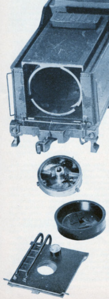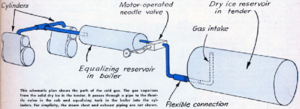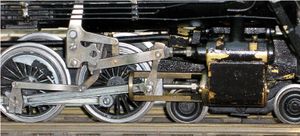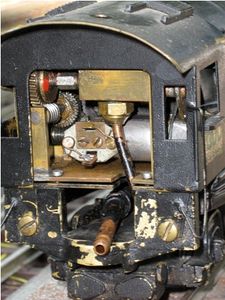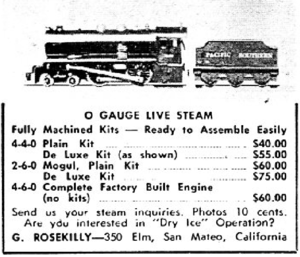Cold Steam Engine: Difference between revisions
No edit summary |
No edit summary |
||
| (4 intermediate revisions by the same user not shown) | |||
| Line 1: | Line 1: | ||
[[Category: | [[Category:History]] | ||
The October 1949 issue of <i>Model Railroader</i> magazine contains an article entitled "Cold Steam Engines", about a very unusual live steam, or rather, cold steam locomotive. The system described was developed by Emil Vollenweider of Sacramento, California. | The October 1949 issue of <i>Model Railroader</i> magazine contains an article entitled "Cold Steam Engines", about a very unusual live steam, or rather, cold steam locomotive. The system described was developed by Emil Vollenweider of Sacramento, California. | ||
| Line 11: | Line 11: | ||
File:DryIce locomotive 2.jpg | File:DryIce locomotive 2.jpg | ||
File:DryIce locomotive 3.jpg | File:DryIce locomotive 3.jpg | ||
File:OGaugeLiveSteam advert.png|O-Gauge Live Steam advertisement by G. Rosekilly of San Mateo, California. The ad mentions "dry ice" steam operation. From "The Miniature Locomotive", September-October 1954. | |||
</gallery> | </gallery> | ||
== External Links == | |||
* [http://www.chaski.org/homemachinist/viewtopic.php?f=8&t=72123 "Running on CO2?", <i>Chaski.org</i>] | |||
* [https://web.archive.org/web/20050204054055/http://www.keveney.com/co2.html "CO2 Motor"] | |||
Latest revision as of 15:56, 26 July 2016
The October 1949 issue of Model Railroader magazine contains an article entitled "Cold Steam Engines", about a very unusual live steam, or rather, cold steam locomotive. The system described was developed by Emil Vollenweider of Sacramento, California.
The photos below show an O scale locomotive modified to operate off the CO2 gas emitted by melting dry ice. The ice is placed in a sealed reservoir in the tender. A pipe leads to the locomotive where a valve controls the flow of pressurized gas to the cylinders. The valve is controlled by an electric motorized mechanism, connected to the two-rail track. The output from the valve flows into a small equalizing tank hidden inside the boiler, and then to the left and right cylinders.
This schematic plan shows the path of the cold gas. The gas vaporizes from the solid dry ice in the tender. It passes through a pipe to the throttle valve in the cab and equalizing tank in the boiler into the cylinders. For simplicity, the steam chest and exhaust piping are not shown. From "Model Railroader", October 1949.
